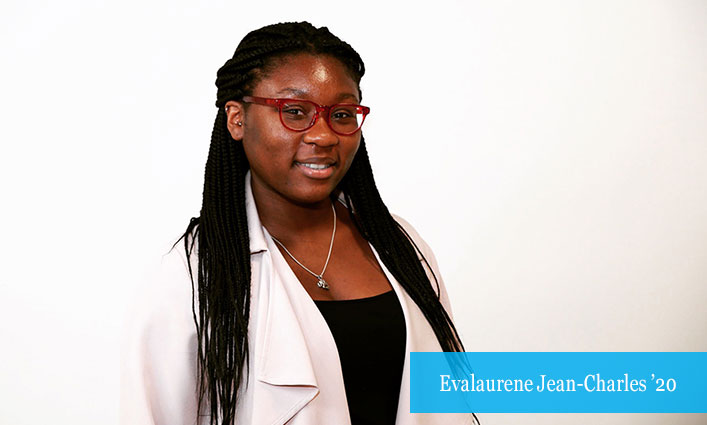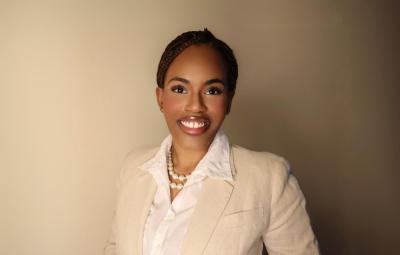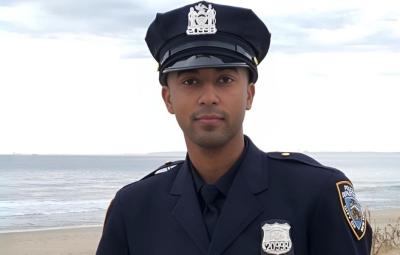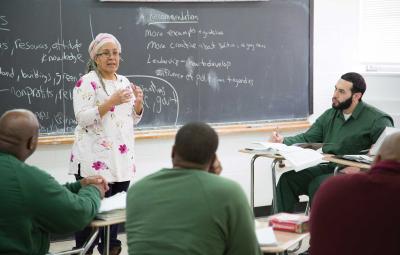
Alumna Evalaurene Jean-Charles ’20 knows representation matters, especially for students of color. And, as Founder and CEO of Black on Black Education, she’s hoping to change how Black students experience learning, by reimagining and redefining what a quality education means for Black communities. “Black on Black Education is a commitment to Black students. And, who are the closest people to Black students? Educators,” says Jean-Charles, who is also starting a teaching position and graduate school this fall. By producing podcasts, events, and resources for Black educators, “Black on Black Education will support and work with educators, making sure that they have information from other Black educators, and the tools they need to support their students and provide them with the quality education they deserve.”
“If this theory of Black on Black crime is going to exist, then there can be Black on Black education.” —Evalaurene Jean-Charles
Experiencing Anti-Black Racism
Jean-Charles’ passion for transforming education and creating a new way of teaching, supporting, and empowering Black students comes from her own upbringing. When she moved to Valhalla, New York, a predominantly white town in New York’s Westchester county, she found herself becoming the target of anti-Black attacks and microaggressions. “It was three weeks into my first year in high school and I got spit on and called the n-word,” recalls Jean-Charles. “Situations like that were always chalked up to individual experiences. They’d say, ‘Oh, it’s just that one kid that said one bad thing,’ or ‘Oh, he wore Black face, but it was Halloween.’ The culture was one where they didn’t believe a conversation needed to happen on a wider scale, because they didn’t believe there were racial undertones to these acts.” In the classroom, Jean-Charles found that her experience, and the experience of Blacks in America, was often overlooked or missing from the lesson plan. “As a student my needs weren’t met, and that’s indicative of the fact that the teaching staff was extraordinarily white and the curriculum was extraordinarily Eurocentric. We went over slavery in America so quickly because it made them uncomfortable.” From the school’s administrative and support staff, she didn’t feel much support either, but there was one person she felt she could always trust and open up to. “For a lot of us students of color, we had only one person to turn to, the only Black guidance counselor at the school. When something happened, she was the one person we could all go to.”
“There’s this tradition of Black on Black education in Black communities that is much stronger and much longer than Black on Black crime.” —Evalaurene Jean-Charles
Finding Herself at John Jay
Going from a predominantly white high school to John Jay, a Hispanic-Serving (HSI) and Minority-Serving Institution (MSI), was life changing for Jean-Charles, who graduated with a CUNY BA in Sociology of Educational Inequity and Social Justice in Underserved Communities. “Coming to an institution like John Jay gave me the opportunity to really find myself and learn about things that were missing from my education experience.” As a student in John Jay’s Honors Program, a McNair Scholar, and a Vera Fellow, Jean-Charles was able to learn from her diverse classmates and engaged in thought-provoking conversations with faculty who wanted to uplift her. In fact, it was at John Jay, while sitting in an Interdisciplinary Studies Program class and listening to Akala, a Black musician from the United Kingdom, speak about his upbringing, that Black on Black Education was born. “Akala talked about an education program that he was in as a child, and how it supported him with learning about his history and his people. The program was Black folks teaching Black folks. And I realized, if this theory of Black on Black crime is going to exist, then there can be Black on Black education. So, I took the idea and ran with it.” That same day, Jean-Charles went home, bought the domain, and created social media pages for Black on Black Education. “At the time, I didn’t know exactly what it was going to be, but I knew it was going to be something.” Soon after, Black on Black Education launched its very first podcast, and earlier this month, the podcast celebrated it’s one-year anniversary.

Teaching Throughout History
The notion of Black folks educating other Black folks isn’t new, it’s been part of the Black American experience for centuries, according to Jean-Charles. “We can go all the way back to slavery where enslaved people learned how to read in the dark of night, by candlelight. They were teaching other Black people how to read. So, there’s this tradition of Black on Black education in Black communities that is much stronger and much longer than Black on Black crime.” Through the platform Black on Black Education, Jean-Charles has created a space for Black educators to come together to share ideas, learn from each other, and build up the next generation of Black learners. The goal is to provide Black students with an educational experience that sees and reflects who they are, takes their identity and their experiences into consideration, and seeks to uplift them. “Right now, the biggest place where Black on Black Education is going to fill the representation gap is in terms of content,” explains Jean-Charles. “As much as we need more Black, Latinx, and Asian teachers in the classroom, we're looking at a public school system, across the nation, that is 80 percent white, and at the administrative level, that percentage is much higher. Unfortunately, that's not going to change in a short period of time. But what can change quickly is the content we provide our students with, and those content changes will allow for diversity to really flourish.”
Producing Content for Educators
Black on Black Education initially began as a social media platform and a podcast, with each episode featuring powerful conversations with Black educators—one episode centered around John Jay’s own Dara Byrne, Ph.D. Associate Provost for Undergraduate Retention and Dean of Undergraduate Studies, discussing the importance of building communities and the impact of going to an MSI. But since its launch, Black on Black Education has grown exponentially, organizing a conference on how to transform education in Black communities, as well as hosting a series of events that bring educators together to discuss their ideas for a super school and how to end racism.

“When you give someone ownership over their own education, when they see themselves reflected in what they’re learning, it’s empowering, and it creates a love of learning.” —Evalaurene Jean-Charles
Empowering the Next Generation
Over the course of the next few months, Black on Black Education will also extend resources to students, producing a journal and children’s book. In “I’m Just a Kid, What Can I Do?: The Guided Journal to Finding Your Way,” Black on Black Education is helping students understand their educational experience through a series of questions, a personality test, and a self-care assessment guide. And, in a children’s book, authored by Jean-Charles, students will get to see the Black Lives Matter movement and protests following the killing of George Floyd through the eyes of a child. “We have to uplift our Black communities. The content we provide our students with is extraordinarily important. Reading Of Mice and Men is cool, but we know how transformative it is for a Black student to read The Autobiography of Malcolm X,” she says. “There has to be an openness to different thought patterns. Diversity, in all its facets, is so important. And bringing that diversity into the curriculum and into the conversations we have with our students is the only way we’re going to be able to see, understand, and empathize with others.”
Jean-Charles’ ultimate goal is to one day create a school and then a new education system where Black students and other students of color get a quality education. Envisioning that goal, and with a deep understanding that education and learning is a two-way street, Jean-Charles says that students in Black on Black Education will have ownership over their own education. “Teachers and students will work in tandem to create their learning experience. When you give someone ownership over their own education, when they see themselves reflected in what they’re learning, it’s empowering, and it creates a love of learning,” she says. “At Black on Black Education we’re going to grow, stay excited, and continue to build on our content and our goals. We’re going to love, support, and care for our Black communities. We’re going to create a love of learning, because with a quality education, there’s nothing that can stop you. Education is the one thing that can’t ever be taken away from you.”



